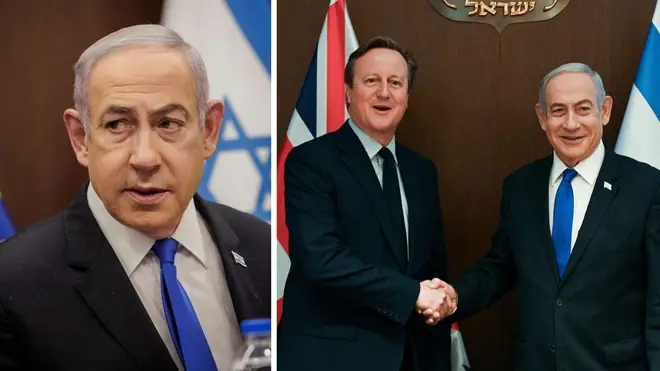
James O'Brien 10am - 1pm
17 April 2024, 19:00

Israel will make its own decisions in response to Iran's attack, PM Benjamin Netanyahu has said after meeting with David Cameron.
Iran launched hundreds of missiles and drones at Israel over the weekend, in response to an apparent Israeli strike on Iran's embassy compound in Syria on April 1.
Israel has since vowed to respond to the unprecedented attack without saying when or how - leaving the region bracing for further escalation.
However, allies have been urging Israel to hold back on any response that could spiral.
The calls were repeated on Wednesday during visits by foreign secretary David Cameron and German foreign minister Annalena Baerbock.

Israel ‘making decision to act’ after Iranian attack, says Cameron
Speaking to a meeting of his cabinet on Wednesday, Mr Netanyahu said he met with both Lord Cameron and Ms Baerbock and thanked them for their countries' support.
But he said Israel would make the call on its own on how to respond despite "all sorts of suggestions and advice" coming from Israel's allies, some of whom - including the US, UK and France - helped Israel repel Iran's drone and missile assault.
"I want to be clear: we will make our decisions ourselves. The state of Israel will do whatever is necessary to defend itself," Mr Netanyahu said.
Despite the tough rhetoric, Israel appears unlikely to attack Iran directly without support from its allies.
However, it could resort to more covert methods such as targeting senior Iranian commanders or Iran-backed groups in other countries, or launching a cyber attack.
Iran's president has warned that even the "tiniest" invasion of its territory would bring a "massive and harsh" response.

James Heappey says the world is in as 'perilous a situation as in the 1940s'
It comes after Joe Biden's administration on Tuesday announced new sanctions on Iran.
US officials said earlier this week that Mr Biden told Mr Netanyahu that Washington would not participate in any offensive action against Iran.
Israel and Iran have waged a shadow war for decades, but the strike over the weekend was the first direct Iranian military attack on Israel.
Earlier on Wednesday, Lord Cameron and German foreign minister Annalena Baerbock appealed for calm.
Lord Cameron said "it's clear the Israelis are making a decision to act" against Iran, but he hoped they would do so "in a way that is smart as well as tough and also does as little as possible to escalate this conflict".